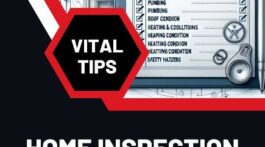A home inspection is a crucial step for buyers before purchasing a house. It provides objective and independent information about the property’s condition, helping buyers make informed decisions. The inspection covers components like the structure, roof, plumbing, electrical and HVAC systems, and major appliances.
Additional inspection may be recommended based on findings, such as radon, termite, mold, or well tests. A home inspection checklist can be extremely valuable to ensure nothing is missed during the due diligence period. Maximum Real Estate Exposure has an excellent guide.
While the inspection cost varies, it is a small percentage compared to the home’s overall value, making it an essential investment for buyers. In my experience as a Massachusetts Realtor, having a home inspected by sellers before listing for sale is also a wise investment. Buyers and sellers should never overlook the importance of a thorough home inspection.
What is A Home Inspection?
A home inspection plays a crucial role in the home-buying process, providing buyers with valuable insights into the condition of a property. It involves a comprehensive evaluation conducted by professional and certified inspectors who thoroughly examine the house’s exterior and interior.
A home inspection identifies potential issues or problems before the purchase is finalized.
The Importance of Home Inspections
Home inspections are paramount to buyers as they offer objective and independent information about the property’s condition. They help buyers make informed decisions and understand the potential risks associated with a purchase.
By uncovering any hidden or underlying problems, a home inspection allows buyers to assess the property’s actual value and avoid unexpected expenses in the future. If the seller has provided a property disclosure statement, having the inspector check on any concerns in their report will be necessary. Sometimes, sellers repair items but don’t do a satisfactory job, and the problem resurfaces after the closing.
On the other hand, a seller may not have the money to make essential repairs but is letting you know upfront so you don’t try to renegotiate after the inspection.
What Does a Home Inspection Cover?
A thorough home inspection covers various components of the property, including:
- Exterior Inspection: The inspector evaluates the external elements, such as the roof, foundation, siding, and drainage systems. This assessment ensures the house is structurally sound and protected from water damage.
- Interior Inspection: The inspector examines the interior components, including the plumbing, electrical systems, HVAC system, and major appliances like the water heater and HVAC unit. They check for proper functionality, potential safety hazards, and any signs of wear and tear.
- Additional Inspections Based on Findings: Depending on the inspector’s findings, other inspections like radon testing, termite inspections, mold assessments, or foundation evaluations may be recommended to address specific concerns or potential risks.
A comprehensive home inspection gives buyers a detailed understanding of the property’s overall condition, enabling them to make informed decisions and negotiate repairs or price reductions if necessary.
It is essential to note that while a home inspection covers many aspects, it may not include testing a private well, environmental risk assessments like mold or radon, or inspecting septic systems. These concerns may require separate inspections for a more thorough evaluation.
In my experience, buyers often skip checking the well, which can be a significant mistake. They see there is ample water and don’t bother. Unfortunately, doing so can come back to bite you. Seeing water coming out of a faucet doesn’t tell the whole story.
You need a professional well inspection to check the quality and quantity. The cost of a well inspection is minimal compared to the peace of mind it provides.
How Much Does A Home Inspection Cost in Massachusetts?
The cost of a home inspection can vary depending on several factors. Understanding these factors will help buyers estimate the potential costs associated with a home inspection.
Factors Affecting the Cost of Home Inspections
The following factors can influence the overall cost of a home inspection:
- The size of the property: Larger homes typically require more time to inspect, resulting in higher prices.
- The location of the property: Home inspection prices can vary based on regional differences in operating costs.
- The age of the home: Older homes often require more thorough inspections due to potential wear and tear.
- Additional features: Properties with other structures or unique features like pools, guesthouses, or extensive landscaping may incur additional inspection costs.
- The complexity of the inspection: Certain properties, such as historic homes or those with complex architectural designs, may require specialized inspections, leading to higher costs.
- Additional services requested: If the buyer wants other inspections like radon, mold, or termite, these will incur additional charges.
Average Cost of Home Inspections
On average, home inspections in Massachusetts can range from around $400 to $700, depending on the abovementioned factors. However, it is essential to note that the price can vary significantly based on the location and size of the property.
While there might be tempting offers for lower-priced inspections, it is crucial to choose a reputable and certified home inspector with a track record of providing thorough inspections. Remember that the cost of a home inspection is a small percentage compared to the overall investment in the property, making it a worthwhile expense to ensure peace of mind and avoid potential surprises down the line.
The Bottom Line: Why Buyers Should Prioritize Home Inspections
When purchasing a house, prioritizing a thorough home inspection is critical for several reasons. It protects your investment and allows you to negotiate repairs or price reductions if issues are discovered.
Additionally, it ensures your safety and provides knowledge that your new home is in good condition. Let’s delve into these critical aspects:
Protecting Your Investment
A home is one of the most significant investments buyers make. By prioritizing a home inspection, you can identify potential problems or hidden issues that may require costly repairs in the future. Uncovering these issues early allows you to decide whether to proceed with the purchase or negotiate for a fair price adjustment.
Negotiating Repairs or Price Reductions
Discovering significant issues during a home inspection provides buyers a valuable opportunity to negotiate repairs or price reductions with sellers. Armed with the inspector’s findings, you can advocate for necessary repairs or request a reduction in the purchase price to account for the cost of addressing these issues yourself. This negotiation power can save you from unexpected expenses down the line.
Ensuring Safety and Peace of Mind
One of the primary benefits of a home inspection in Massachusetts is the reassurance it provides regarding your safety within the property. An examination highlights any safety hazards, such as faulty electrical systems or structural weaknesses, ensuring that you and your family will be secure in your new home. This peace of mind is invaluable, knowing that you are moving into a residence that meets the necessary safety standards.
Next Steps After the Home Inspection
Understanding the Inspection Report
Once the home inspection is complete, you will receive an inspection report detailing the findings and recommendations. Take the time to review and understand the information carefully, paying attention to any significant issues or safety concerns identified.
If any areas of the report are unclear or require further clarification, don’t hesitate to contact the inspector for additional information.
Consulting with Professionals and Experts
Sometimes, the home inspection report may reveal complex or specialized issues requiring further expertise. Consider consulting with professionals, such as structural engineers, electricians, or plumbers, to further evaluate specific concerns. Their knowledge and insights can help you decide on necessary repairs or renovations.
Addressing Major Issues Before Closing
If the inspection report highlights significant issues that need attention, addressing them before purchasing is essential. Work with your buyer’s agent and the seller to negotiate repairs or other solutions to resolve these issues satisfactorily.
When a seller doesn’t have the money to pay contractors for repairs, you’ll want your agent to attempt to negotiate for a seller’s concession. Remember that negotiations will be more acceptable in a buyer’s or neutral market. In a strong seller’s market, getting concessions is much more challenging.
Reaching an agreement that satisfies both parties and protects your investment is crucial, but be open-minded.
Considerations for Additional Inspections (such as Radon and Mold)
Based on the inspection report or specific concerns about the property, you may consider additional inspections for potential hazards like radon or mold. These inspections can provide valuable information about any hidden dangers affecting your health or the property’s integrity.
Discuss these options with your inspector or real estate agent to determine whether further assessments are necessary.
Finalizing the Purchase Agreement
Once any significant issues have been addressed and additional inspections have been conducted, it’s time to finalize the purchase agreement. Work closely with your real estate agent and legal counsel to ensure all necessary paperwork is completed accurately and on time. By thoroughly understanding the terms of the agreement and fulfilling your obligations, you can proceed confidently toward achieving the home-buying process.
A home inspection in Massachusetts is an investment in where you’re about to call home. Understanding what you should have inspected will ensure you don’t discover problems after living in the house. Hopefully, this inspection guide has been valuable.












No Comment